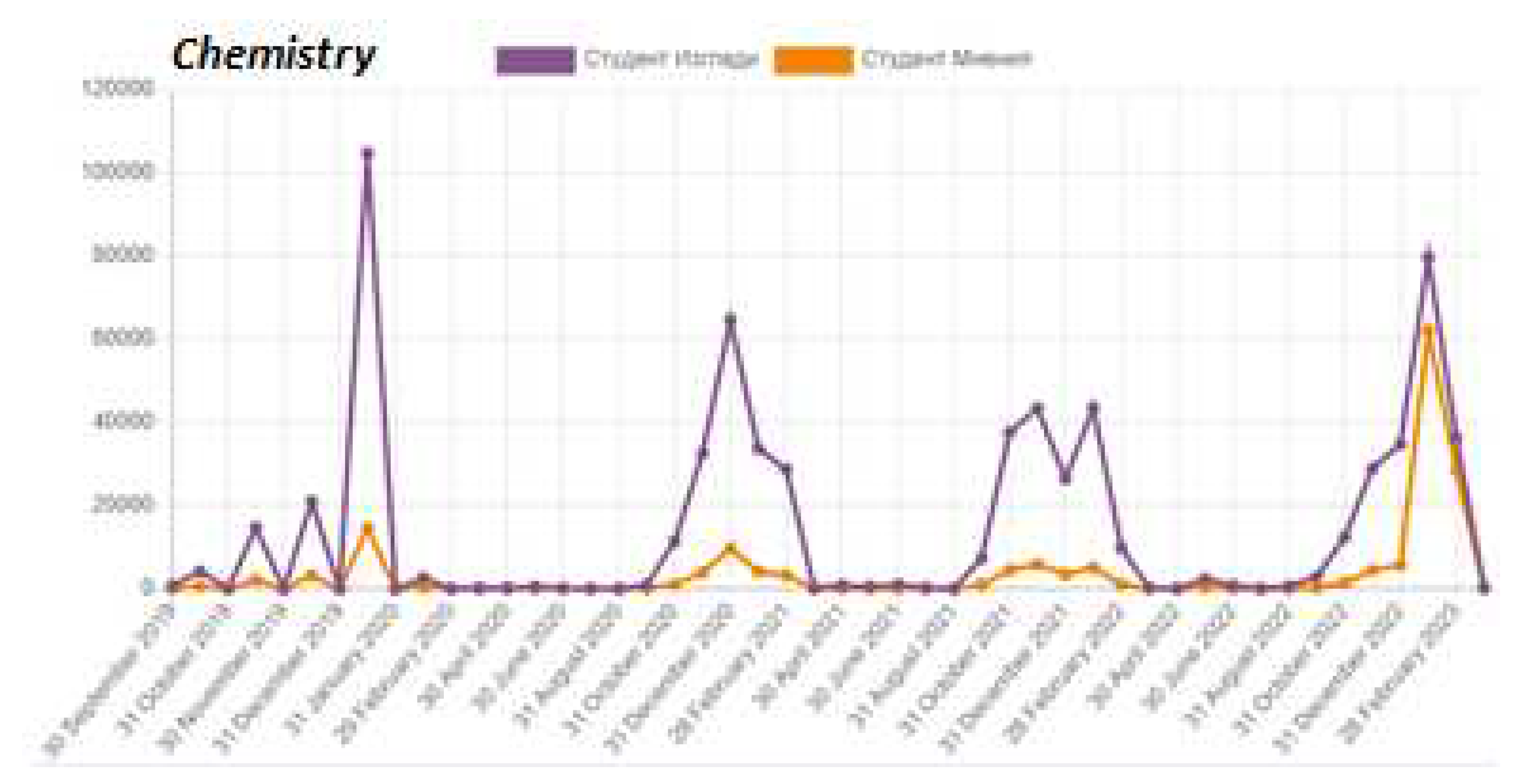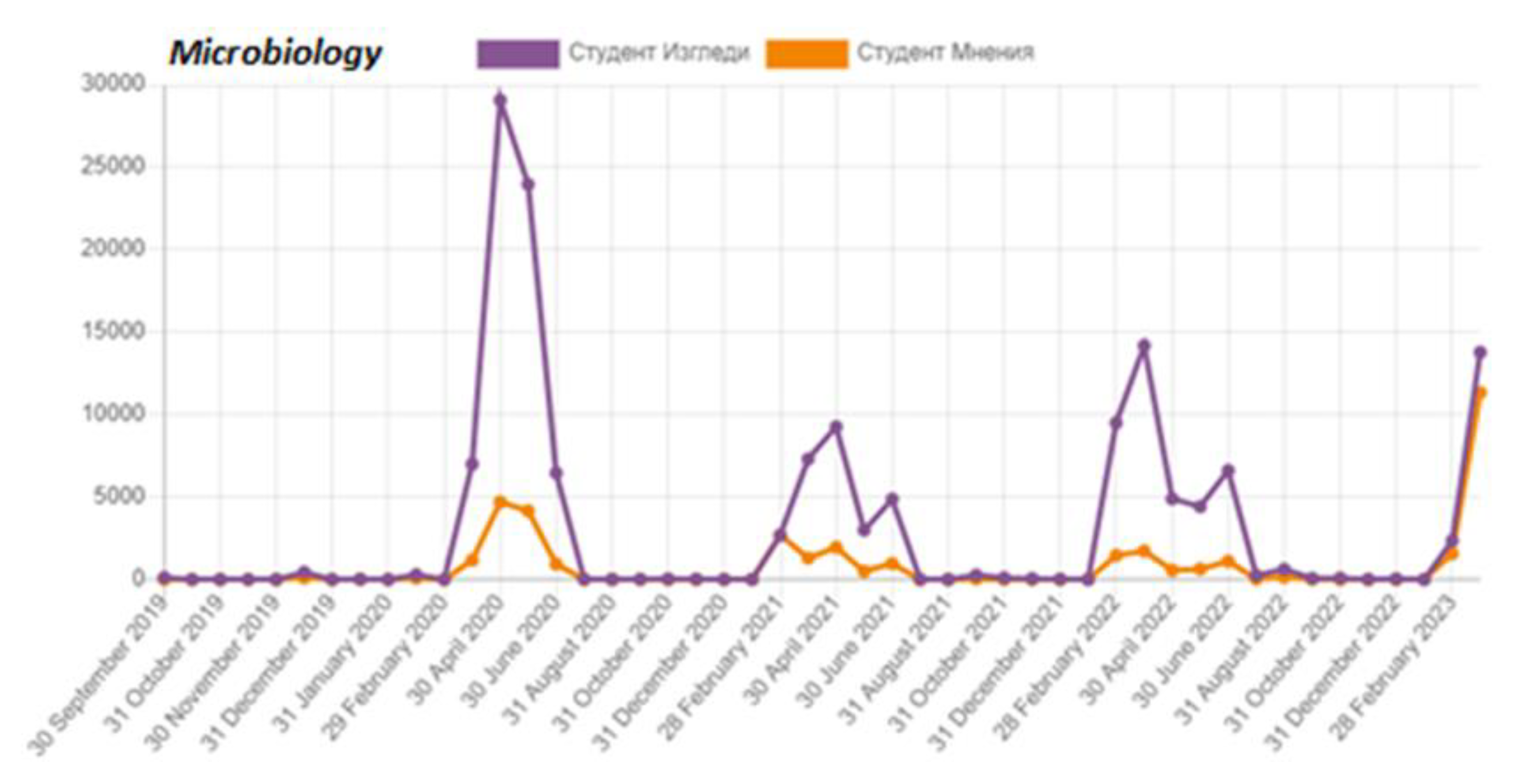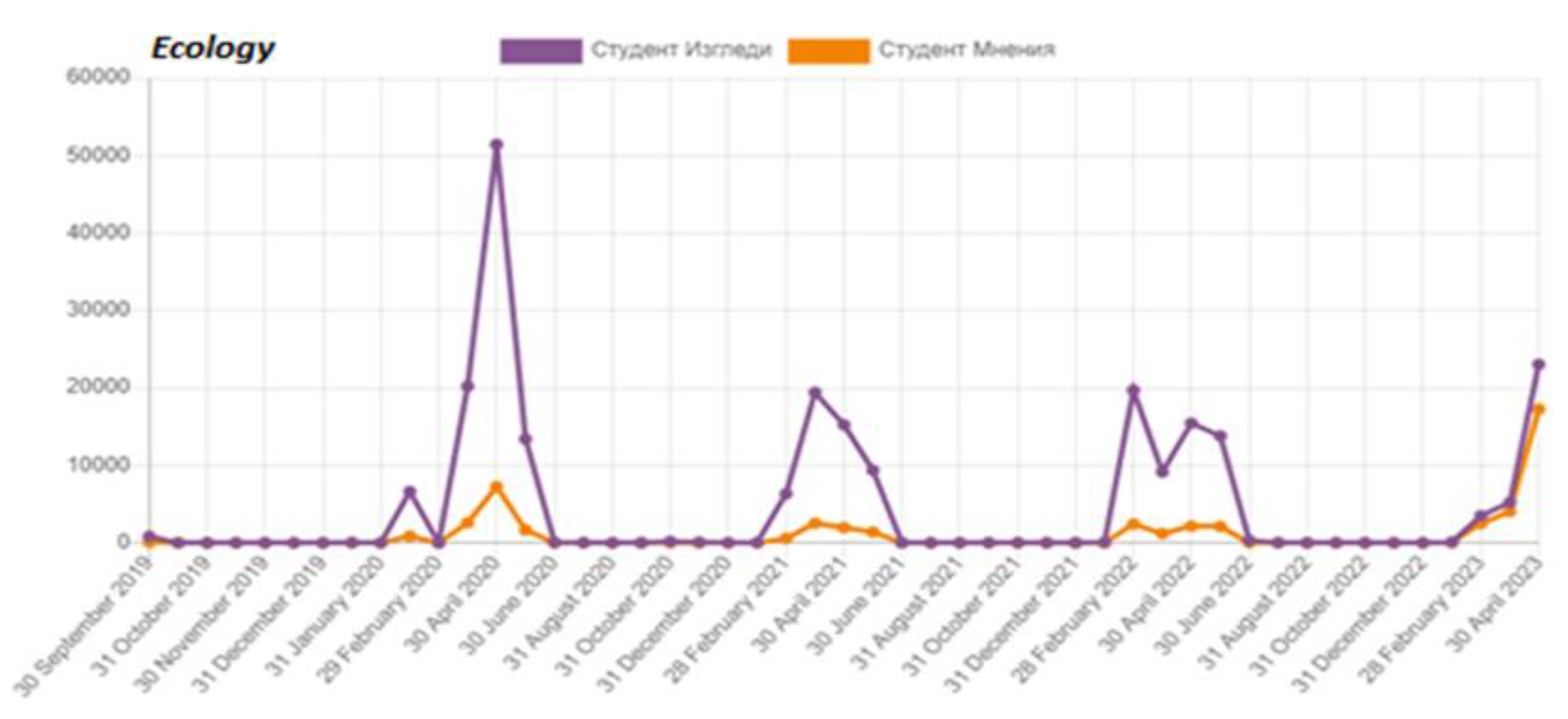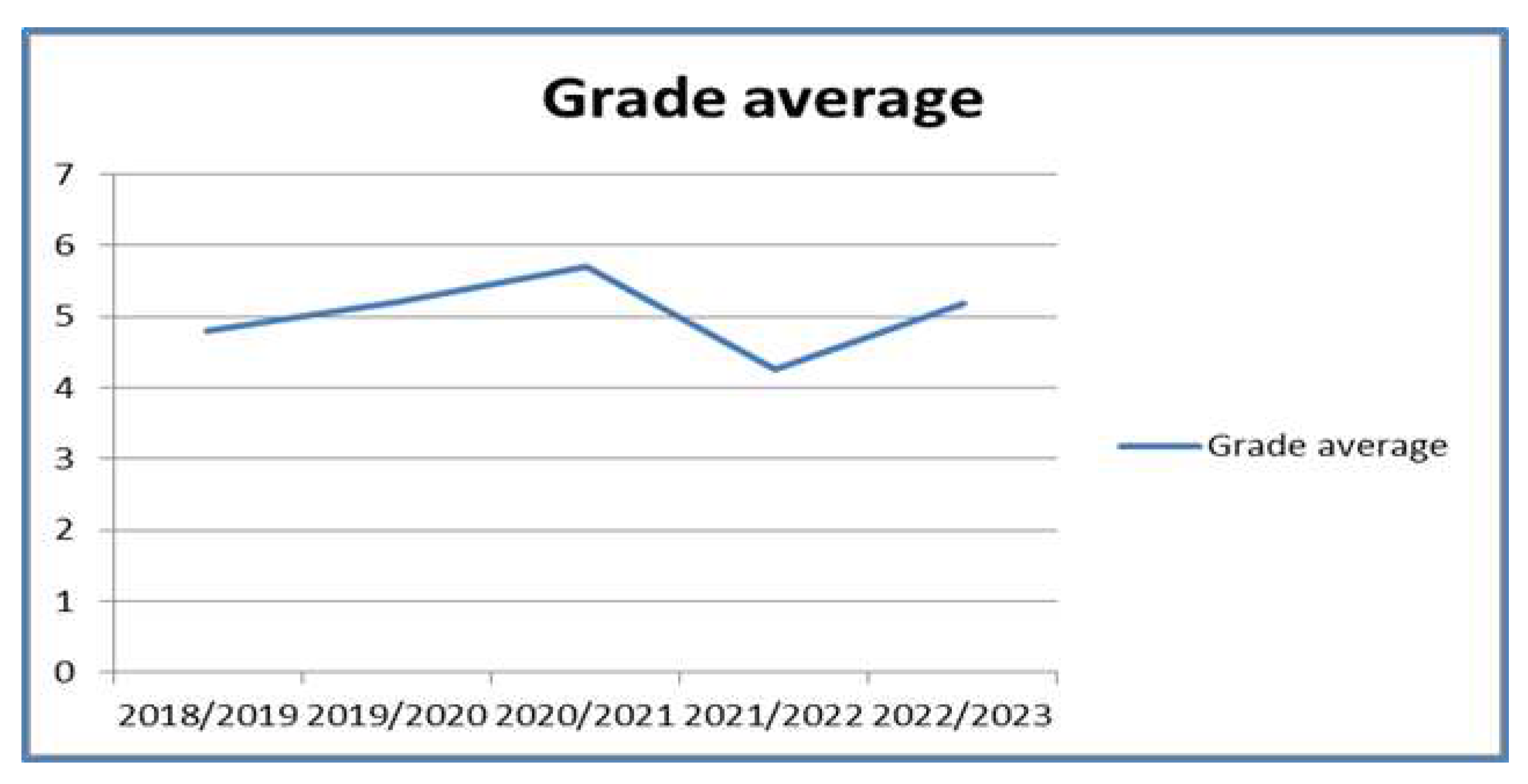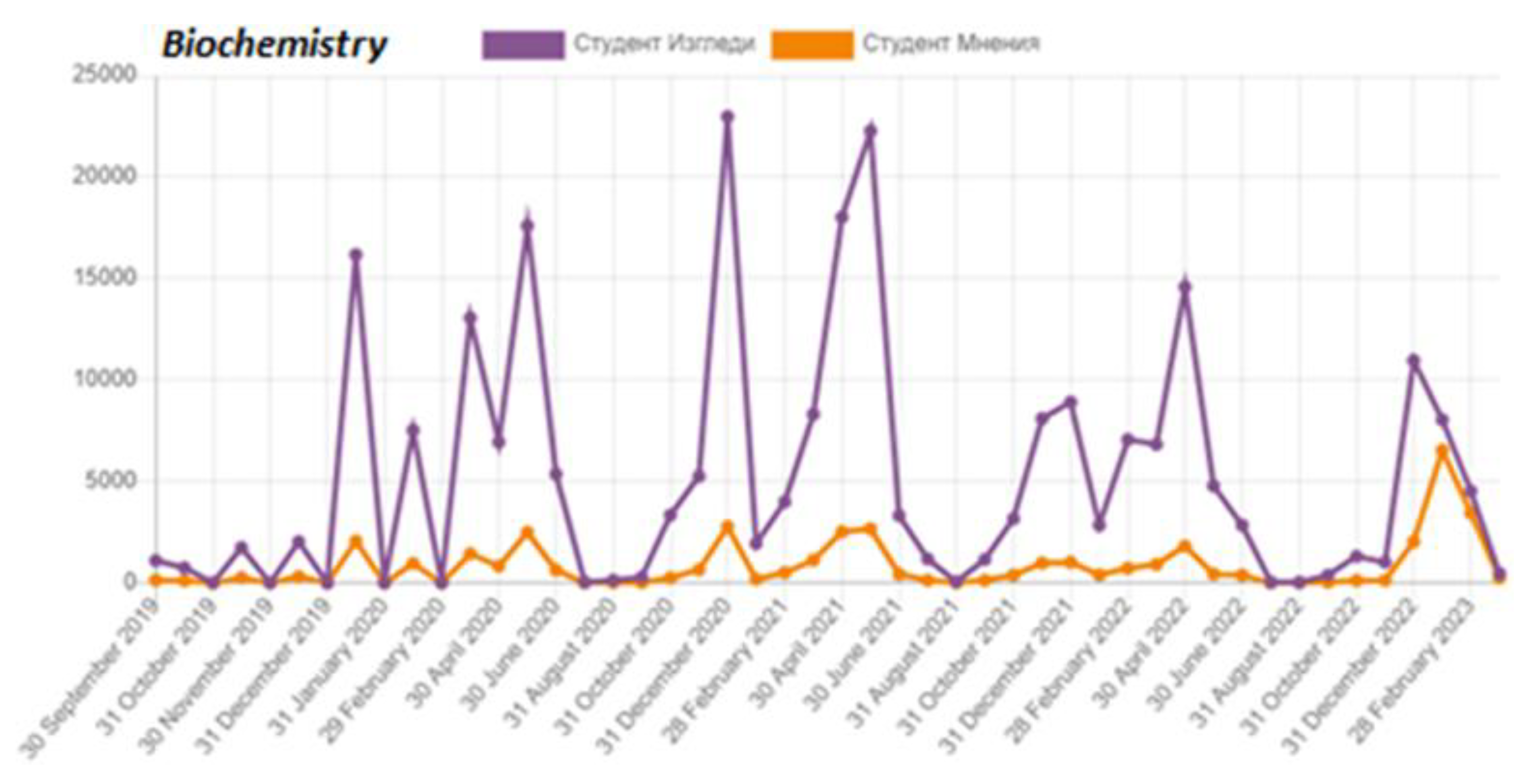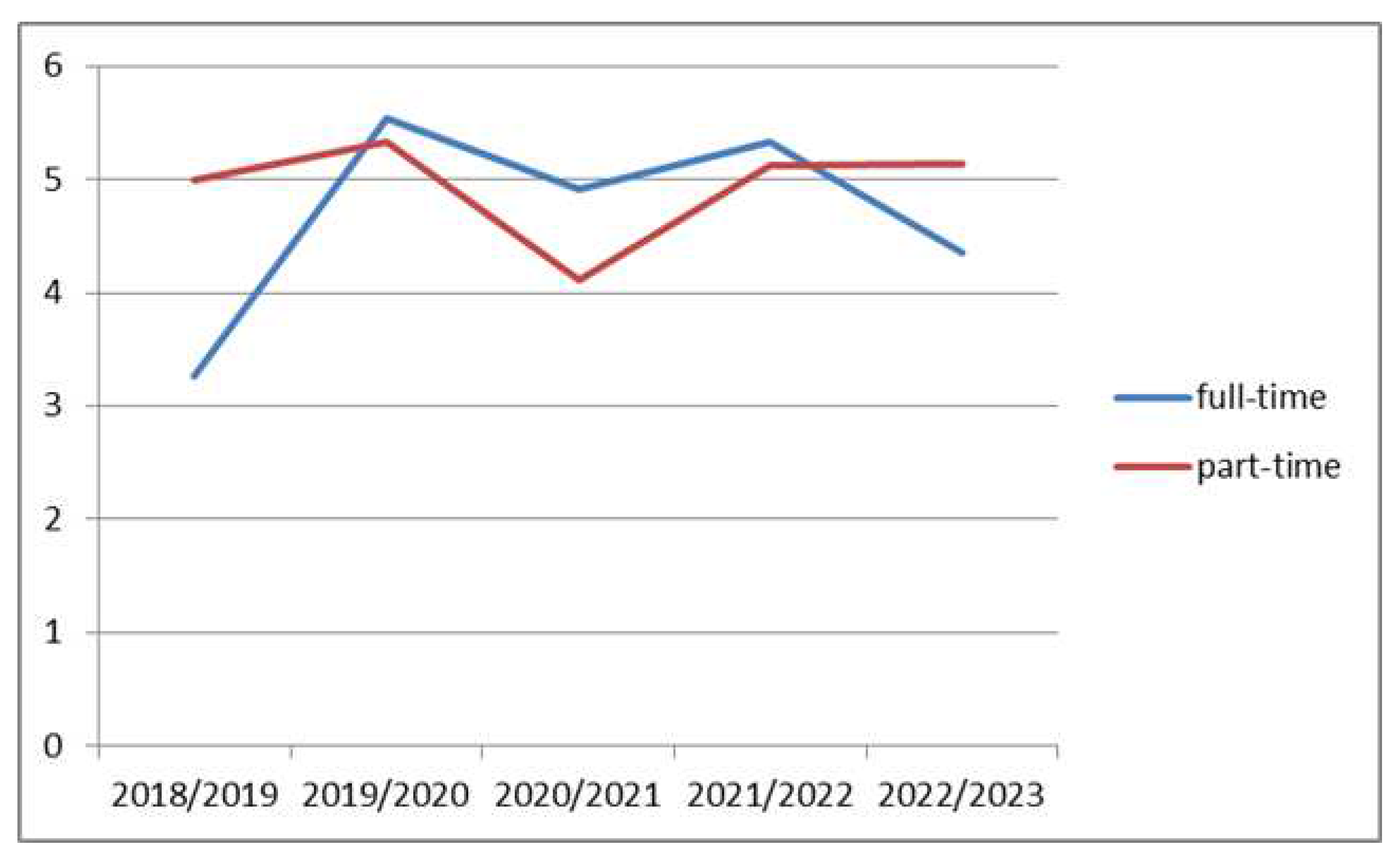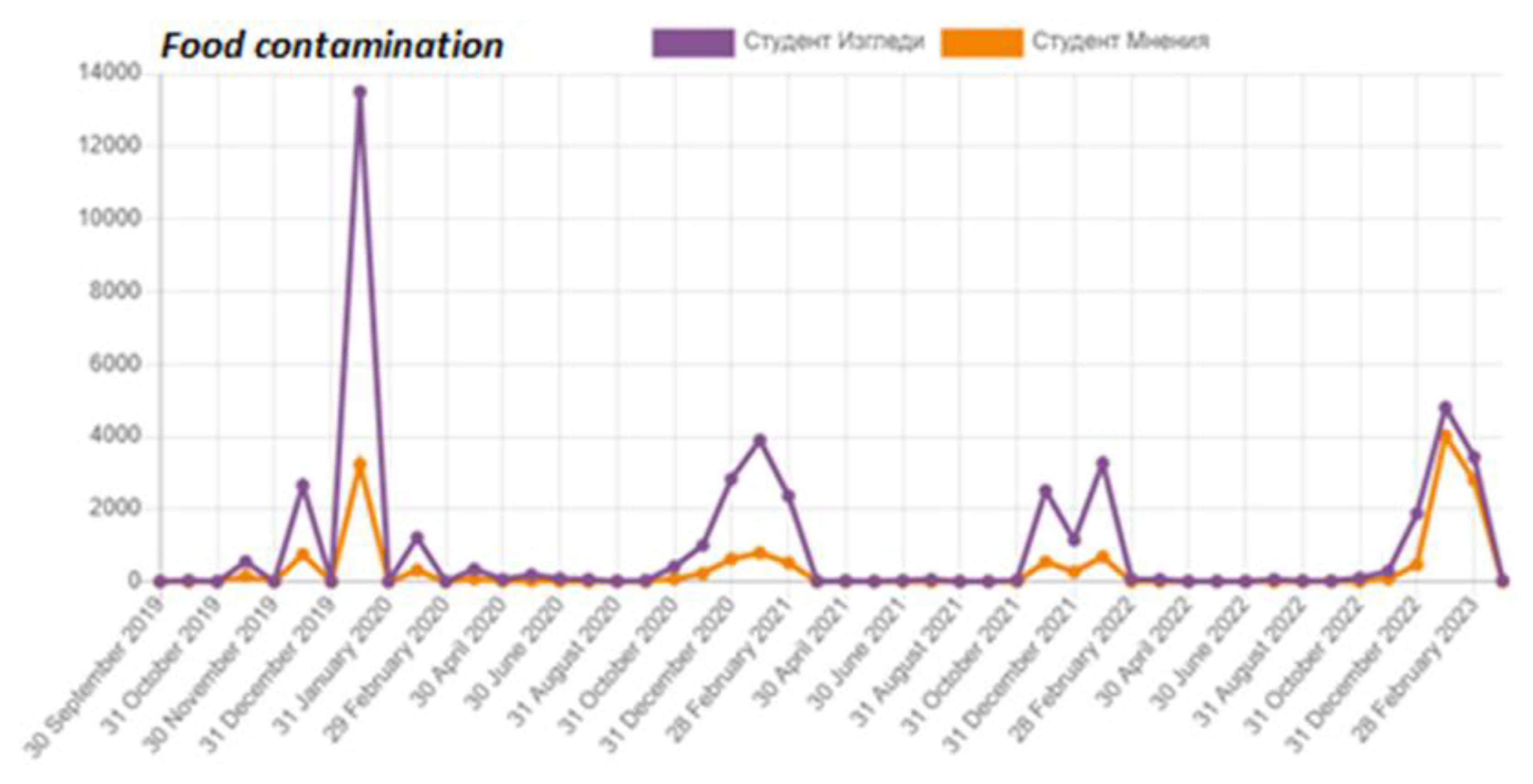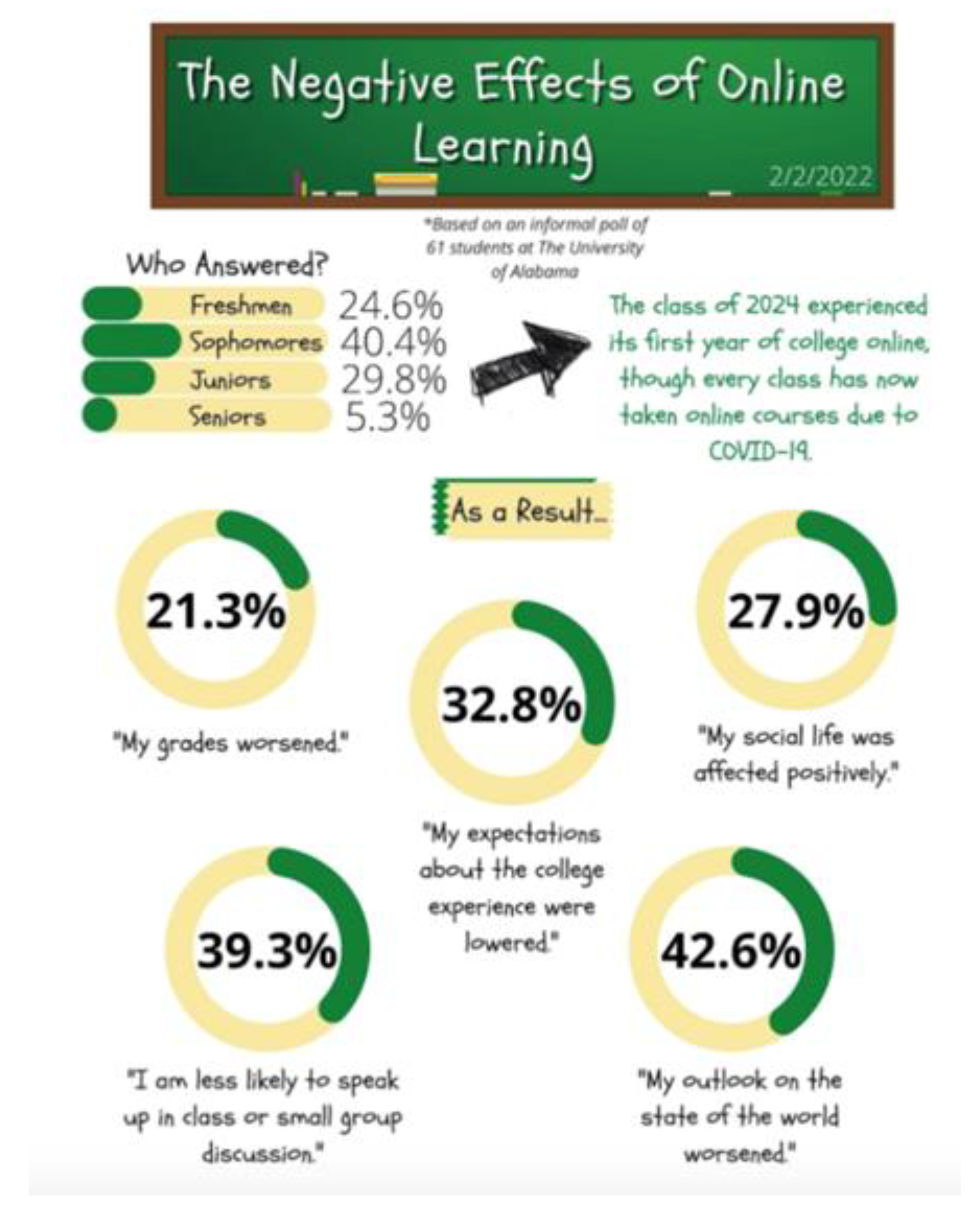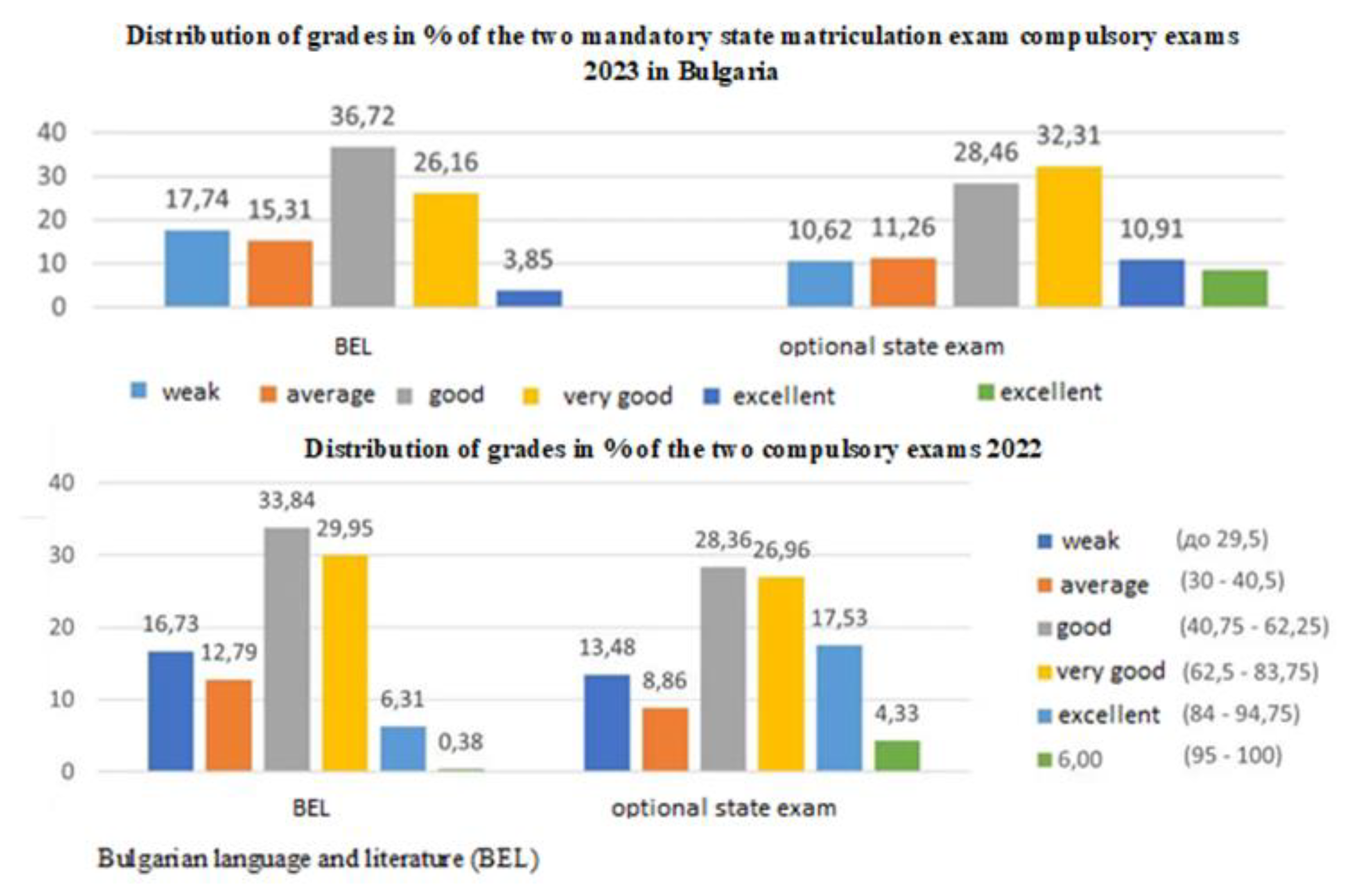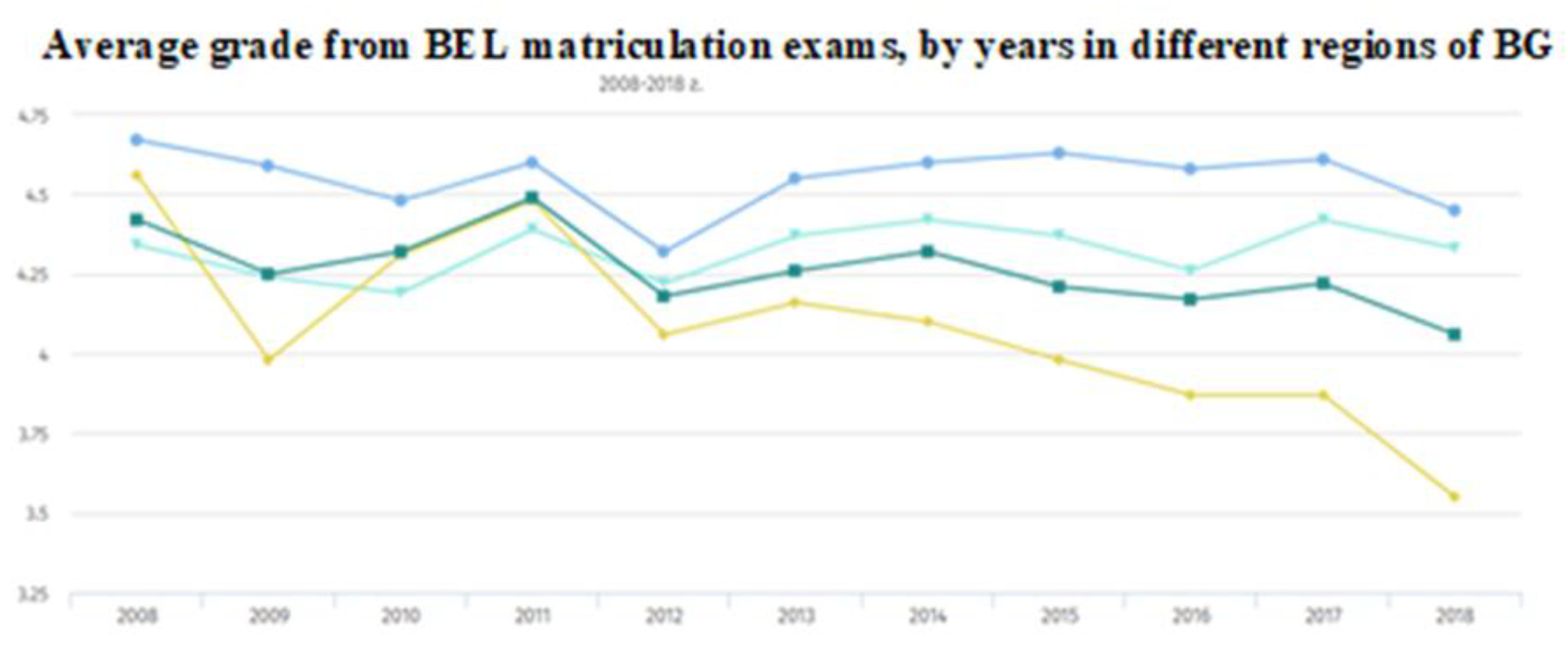1. Introduction
The world has been messed up by the COVID-19 pandemic, many changes enter in the lifestyle, especially digitalization, and there is no possibility of returning back to the pre-pandemic period [
1,
2,
3]. Working remotely with the assistance of virtual gatherings has become normal, the data from the survey indicated that 78% of people claim that they were as effective or even more effective working distantly [
4].
The labour practices and supervision adoptions in organizations during the pandemic are vital questions of academic study in the post-pandemic period [
1]. Perhaps, in the post-pandemic period, IT will raise a competitive advantage by endorsing sustainability through digital transformation [
3]. The program for the establishment of a digital transformation community has been accepted on 14 December 2022 by the EU Parliament "Digital Decade Policy Programme 2030" [
5]. The digital era is calling for a new know-how, linked in a special way to know how to be and live together to transform society in a sustainable way [
6].
The article analyzes the grades results of session exams before, during, and after the COVID-19 pandemic, and aims to clarify the influence of the pandemic period on the quality of education in the high institutions itself.
2. Materials and Methods
Trakia University has had an online virtual learning environment on Moodle since 2008, and blended learning was successfully applied before the COVID-19 pandemic. The pandemic just forced educational institutions to adopt remote learning and online exams. Due to the COVID-19, Trakia University's academic staff made all teaching materials available online, and instead of traditional in-person lectures, students accessed their lectures through Google Meet, and BigBlueButton of Moodle digital platform. Also Trakia University has a Center for Electronic and Distance Learning (CEDO). The University Center for Information and Computer Services (CIKO) assists CEDO in performing the main functions of the technological and the technical provision of distance learning forms. All semester and state exams in absentee format are held remotely through an electronic assessment and testing system with set attempts and stored exam data and records for at least 5 years in an accredited distance learning environment.
Using the electronic data from the integrated information system at Thrace University - Stara Zagora (TrU - St. Zagora) the results from the session exams can be compare, for year before, during and after the pandemic lockdown. Hence, in the article are discussed the results of students grade, which are study in Faculty of Technics and Technologies, full-time and part-time form of education.
3. Results
As a result of the shift to online learning, students at Trakia University started to prefer online exams and distant forms of education. Online exams allow students to take their exams remotely, without the need to physically go to an exam. Distant forms of education refer to the flexibility of studying at one's own pace from different locations, rather than being tied to visiting the University. Nevertheless, lower performance, for session grades of exams has been registered, and quit learning also, or increasing dropout of students. The results from session exams for some disciplines are shown in
Table 1, for the summer session of the academic year 2020 – 2021 in
Table 3.
According to Yasmin, online classes negatively affect the grades of students, producing psychological pressure (58%), frustration (80%), and poor grades (83%) [
7]. The decrease in grades after COVID-19 in college education has been registered for online learning at The University of Alabama together with complications in students’ social lives [
8]. Rakow et al [
9], and Tahira& Anum [
10], also reported that virtual learning environments (VLEs) affects students’ productivity, academic performance, and mental wellbeing [
9,
10].
Table 1 did not perform the real situation, because it not include students that did not make attempt to take the session exams, or dropout due to uncertified semester, or poor success, so the data should be discussed together with data given in
Table 2.
Table 2.
Students that are dropped due to uncertified semester of poor success.
Table 2.
Students that are dropped due to uncertified semester of poor success.
| |
2015 |
2016 |
2017 |
2018 |
2019 |
2020 |
2021 |
2022 |
2023 |
| Left of his own accord |
10 |
21 |
18 |
11 |
7 |
10 |
15 |
19 |
5 |
| Suspended |
114 |
55 |
84 |
96 |
72 |
87 |
71 |
48 |
113 |
| Dropped due to uncertified semester |
- |
- |
- |
- |
- |
- |
2 |
39 |
87 |
| Dropped due to poor success |
- |
- |
- |
- |
- |
1 |
3 |
25 |
14 |
Table 2 gives information about dropped students, due to poor success, uncertified semesters, suspension, or leaving of their own accord. Most of the students are in their second and third year of education.
Nevertheless, particularly the best presented data is in Table №3 that summarizes information about academic year 2020 – 2021, summer session results, where can be seen the number of students enrolled and certified in the summer semester, students with more than 2 low ratings, and average success of each group and course.
Table 3.
Summer session results of the academic year 2020 - 2021 for the educational qualification degree EQD "Bachelor"grade for the Academic year’s regular sessions.
Table 3.
Summer session results of the academic year 2020 - 2021 for the educational qualification degree EQD "Bachelor"grade for the Academic year’s regular sessions.
| Specialty |
I course |
II course
|
III course |
IV course |
| Number of students enrolled in the summer semester |
Number of students certified summer semester |
Students with more than 2 poor grades |
Average success of the group |
Number of students enrolled in the summer semester |
Number of students certified summer semester |
Students with more than 2 poor grades |
Average success of the group |
Number of students enrolled in the summer semester |
Number of students certified summer semester |
Students with more than 2 poor grades |
Average success of the group |
Number of students enrolled in the summer semester |
Number of students certified summer semester |
Students with more than 2 poor grades |
Average success of the group |
| Regular training |
| MTAM |
20 |
20 |
9 |
4.32 |
18 |
18 |
9 |
4.04 |
13 |
13 |
4 |
4.19 |
19 |
19 |
1 |
4.78 |
| DTMMI |
6 |
6 |
2 |
4.29 |
5 |
5 |
3 |
5.06 |
2 |
2 |
1 |
5.60 |
4 |
4 |
- |
5.60 |
| EE |
8 |
6 |
2 |
4.21 |
4 |
4 |
1 |
3.33 |
3 |
3 |
- |
5.33 |
6 |
6 |
- |
5.38 |
| ACS |
23 |
21 |
6 |
4.34 |
21 |
21 |
6 |
4.40 |
13 |
13 |
1 |
4.48 |
15 |
15 |
1 |
4.35 |
| TGS |
15 |
15 |
6 |
4.49 |
6 |
6 |
1 |
4.00 |
2 |
2 |
- |
4.83 |
10 |
10 |
- |
5.03 |
| FT |
15 |
15 |
6 |
4.40 |
13 |
13 |
5 |
4.71 |
14 |
14 |
2 |
4.98 |
10 |
10 |
- |
3.92 |
| Total: |
87 |
83 |
31 |
4.34 |
67 |
67 |
25 |
3.55 |
34 |
34 |
8 |
4.90 |
64 |
64 |
2 |
4.83 |
| Part-time training |
| MTAM |
18 |
17 |
11 |
4.01 |
30 |
29 |
7 |
4.09 |
32 |
31 |
8 |
4.40 |
30 |
30 |
4 |
4.71 |
| DTMMI |
5 |
5 |
2 |
4.10 |
4 |
4 |
1 |
5.00 |
5 |
5 |
- |
4.91 |
4 |
4 |
- |
5.26 |
| EE |
8 |
8 |
1 |
3.70 |
7 |
7 |
2 |
4.05 |
9 |
9 |
- |
5.11 |
10 |
10 |
- |
4.93 |
| ACS |
10 |
9 |
1 |
4.37 |
14 |
14 |
2 |
4.10 |
18 |
18 |
1 |
4.34 |
15 |
15 |
1 |
4.77 |
| TGS |
9 |
9 |
4 |
4.69 |
8 |
8 |
- |
4.63 |
8 |
8 |
- |
3.86 |
7 |
7 |
- |
5.12 |
| IE |
9 |
9 |
3 |
4.08 |
8 |
8 |
1 |
4.25 |
5 |
5 |
- |
4.75 |
- |
- |
- |
- |
| FT |
7 |
7 |
1 |
4.47 |
8 |
8 |
1 |
4.77 |
7 |
7 |
1 |
4.50 |
6 |
6 |
- |
4.60 |
| Total: |
66 |
64 |
23 |
4.90 |
79 |
78 |
14 |
5.15 |
84 |
83 |
10 |
5.31 |
72 |
72 |
5 |
4.13 |
It makes an impression that students which are with more than two weak grades are mostly from the first and second academic years, it means that they entered to study, when the teaching was transformed only to distant digital online learning form, so they have never attend before face-to-face training in the University, or they have only 3 months of that training (II course students). Since they did not have the opportunity to attend face-to-face training, they may have faced challenges in adapting to the online learning environment. This could have contributed to their weaker grades compared to students who had prior experience with face-to-face training.
Table 4 shows results from the students of Master's degrees. By comparing these results with
Table 3, it becomes apparent that there was not a significant failure in the session exams for Master's degree students. This suggests that the impact of online learning on academic performance may be more pronounced for undergraduate students compared to Master's degree students.
The students from Master's degrees are older than bachelor students, and they in most cases are students who have studied in Faculty of Technics and Technology before. That results are with synchrony to Sánchez et al, which found that the variables explaining student e-learning success are age, gender, degree of study, educational level, and locality [
11]. The effectiveness of virtual learning varies amongst age groups [
12].
4. Discussion
4.1. The results of self – preparation activity and session exams in Chemistry
Online learning is less effective than face-to-face learning and teaching [
13]. Especially for chemistry, the online learning approach faces more challenges than for other subjects [
14].
Figure 1, demonstrates the results from completely distance online learning of General chemistry, 2020/2021 winter session, and 2021/2022, the activity and performance of the students dropped significantly compared with the study year before the COVID-19 pandemic.
If we look at the specialty “Automation and computer systems” (ACS) – winter session (19.01.2022), part-time study – in the protocol is mentioned that did not take the exam: 5students, so the real success of the group is not Very good (5.22), as it is shown in Table №1, but grade of Average (3.19)**, thus the
Figure 1, much better describes the real state. On the Semester exam, Session: Remedial, part-time study, only 3 students out of 8 took the exam with an Average (of 3.00) for each of them, 5 did not income for the exam. For the same specialty, but full time study the results in protocol are Very good (4.50), but 10 students of 26 did not take the exam, so with the correction the results fall to Average (2.75). On the Remedial Session, full-time study, 4 students from 13 took the exam with an Average (of 4.50), but 9 did not income on the exam.
The same trend can be found for the other specialty "Motor transport and agricultural machinery" (MTAM) winter session (28.01.2022), part-time study - 8 students did not take the exam, so the real achievement of the group is a grade Average (3.28)**, instead of Very good (4.82). For the same specialty, but full-time study the grade with correction is Good (4.137)**, not Very good (4.62). In the Remedial Session (full-time study) 9 students from 16 took the exam with an Average (of 3.78), but 7 did not income on the exam, and 4 have Weak (2.00).
The worst situations were for the specialties "Design, technology and management of the fashion industry" (DTMFI) and "Heat and gas supply" (HGS). For HGS, from 11 students, only 3 took the exam with a grade (4.33), and 8 did not make an attempt, so
Figure 1, correctly explains the low performance of students, that appears as no activity for self-preparation, high drop-out and lower grade on the session exam. For DTMFI the group consisted only of 1 student, the others were not successfully certified the semester (see Table №2). Chemistry appears to be a tough discipline for acquiring knowledge online. In order, to grasp chemistry topics, good mathematical skill, a strong understanding of basic principles like atomic structure, chemical bonding, and stoichiometry is essential [
15]. Chemistry, like any other discipline, requires steady effort and review, good motivation, and eagerness to learn [
15].
A questionnaire on students’ perception of online learning in chemistry has been distributed to 385 students, more than >50% perceive online chemistry learning positively, especially with regard to material teaching method and learning atmosphere. However, the dimension of social interaction is found to have more negative responses (>80%) than positive ones. Although students may be adapted to learning chemistry online, the interactions and communication with their peers and students are difficult. Online communication and interaction seems to hinder students’ social interactions, and this may lead to disturbing their mental health and psychological well-being [
16]. The same results were obtained for Pakistani learners and teachers, online learning teaching method (OLTM) didn’t prove to be beneficial for higher education and they faced various physical, social, economic, and psychological problems [
10].
4.2. The results of self – preparation and exams in Microbiology
In
Figure 2 can be seen that exam results for Microbiology subject are low during and after the COVID-19 pandemic.
The same results are obtained from University of Saarland, Germany, participated in an online-only course in medical microbiology. Test performances, failure rates, and student evaluation, including open-response items, of the course during the summer term 2020 were compared to the summer term 2019 [
17,
18].
4.3. The results of self– preparation and exams in Ecology
Attendance in Ecology lectures drop dramatically after pandemic, most students prefer to attend with the part-time learning students, complaining of lack of time, working, family care and etc. (
Figure 3).
Also, perhaps the war in Ukraine obviously affects their perception and influences, their motivation to study, seeing the nonsense in that field with so many red alerts, programs, and completely opposite actions. Results of Ecology grades from
Table 1 are represented as a line trend and display a mean for all specialties (
Figure 4).
If closely look at
Figure 3 and
Figure 4, they almost have the same trends, it's completely normal, because Ecology discipline is studied IV academic year, the summer semester, and all students attend the exam.
4.4. The results of self – preparation and exams in Biochemistry
Figure 5 demonstrated results of students' activity and performance in Biochemistry, here the trends are different if compare with the other subjects, the activity drops in the second year of the pandemic. Perhaps, in the first year, the motivations were high because we discussed the COVID-19 worldwide cases, new variants, and vaccines.
Nevertheless, after the pandemic, the level of performance is still lower than before the pandemic, and equal to the second year of the pandemic (
Figure 5 and 6), even though all learning activities are returned to the traditional old methods. The fluctuation of average grades from
Table 1, for Biochemistry I part is given in
Figure 6.
Actually, several studies reveal that comparing pre-COVID-19 academic performance and during the 2020 semester top-performing lower-income students expert a decrease in both grades (5% lower) and earned credits (11% fewer) [
19,
20,
21]. According to [
22], Covid-19 has affected the performance of university students and on students’ self-perception not limited to the short run.
4.5. The results of self – preparation and exams in Food Contamination
The first peak on the trends line in
Figure 7 is the online exam that was conducted after traditional attention of lectures and distance assessment in the BBB – module environment. As it is obvious, the grades and activities of students are much bigger compared to the other three sessions.
The last peak in
Figure 7 is the exam immediately after the pandemic, the attention of lectures was traditional face-to-face and the exam was in a computer room. The same trend has been discovered for the Ecology subject (
Figure 3 and 4), and that difference in student performance is fear-provoking. The self-preparations increased, but the performance decreased.
It has been reported that online learning decreasing the value of a collegiate education, and caused problems for college students’ social lives and grades [
8].
Figure 8 showed the results of anonymous poll which asked students about their online learning experience (In Jan. 2022, 61 students at The University of Alabama).
According to [
23], online education accelerates cheating and students report that faculty and administration do not care about that event. The need for in-person collaboration and mentorship is a reason for returning to the office [
24]. Having good relationships with colleagues is a key to building a rewarding and effective work experience [
25]. Although online learning works as a temporary alternative, it cannot substitute face-to-face learning [
13]. It has been found that 80% of students attended online courses with a progress rate of 86.57%, and there was a statistically significant difference in progress rate by grade. The study found that students were not satisfied with the online classes, with a mean score of 3.87 out of 5. Students expressed that they would not recommend others to take online courses [
26].
Overall, while online classes offer flexibility and convenience, they also come with certain disadvantages such as limited face-to-face interaction, difficulty staying motivated, limited access to resources and support, technical difficulties, and feelings of isolation. It is important for students to be aware of these challenges and develop strategies to overcome them in order to make the most out of their online learning experience.
4.7. Discussion on the results from the compulsory matriculation exam in Bulgarian language
Similar results are registered for the secondary education. The average result of the 2023 class of the compulsory matriculation exam in Bulgarian language and literature is 50.14 points, which corresponds to a good grade of 3.93. The result is comparable, but slightly lower - by about 2.5 points, than that of the previous year (
Figure 9).
Good 4.05 is the average grade of the mandatory state matriculation exam in Bulgarian language and literature (BEL) for 2022. The graduates obtained an average of 52.77 points out of a total of 100. This is shown by the results published of the mandatory state matriculation exams in Bulgarian language and literature and in profiling subjects of the May session. The average result of the second compulsory matriculation exam in a profiling subject is 62 points which corresponds to a good grade of 4.48 (
Figure 9).
The average result of the state matriculation exam in Bulgarian Language and Literature 2021 is 52.44 points, which corresponds to a grade of good (4.14). This value is fully comparable with the data of the previous two years. The difference with 2020 is less than one point in favor of last year. However, 2020 year's result is almost two points higher than in 2019, in which the training was fully present.
The weaker results of the mandatory state matriculation exam for regular training are for 2018 (
Figure 10), the announced national average grade of Good 4.24, but that result is much more than the results today for 2023 a good grade of 3.93.
4.8. The positive and negative effects of online education
4.8.1. The positive experience of students from online education
During nearly two years of pandemic, both teachers and students gained experience in online education and assessment [
27]. Positive experiences according online education, involved: flexibility, cost-effectiveness, convenience, self-paced, availability of technical support, and ease of connection [
13,
28].
Online learning and assessment accelerated both opportunities to cheat or to dig into knowledge [
29]. Students agree that online learning is helping them cheat and gain knowledge simultaneously. Nevertheless, students tried to avoid cheating, but negative pressure can push them to be dishonest [
29].
4.8.2. The negative perceptions of students from online education
The negative students perceptions included: delayed feedback from instructors, unavailable technical support, lack of self-regulation, interaction and motivation, the sense of isolation, monotonous instructional methods, and poorly-designed course content [
28]. The main disturbances of online learning are technical failures, no access to the Internet, a lack of technical knowledge of Internet devices and learning platforms [
13,
30,
31]. Also it is a big challenge especially for deaf and hard of hearing students [
13]. Dealing with technical difficulties can be frustrating and time-consuming, potentially affecting the overall learning experience.
The advantages of online learning identified in other studies seem to diminish in value, while disadvantages become more prominent [
30]. The disadvantages of online classes, according to students’ perceptions are: Lack of face-to-face interaction; Difficulty staying motivated; Limited access to resources and support; Technical difficulties; Isolation [
32]. Technical issues are the most important, followed by teachers’ lack of technical skills and their teaching style improperly adapted to the online environment. However, the last place was assigned by students to the lack of interaction with teachers or poor communication with them [
30]. The absence of a physical classroom environment and the flexibility of online learning can sometimes lead to procrastination and a lack of commitment to completing assignments and studying. VLE impacted students’ motivation, ability to think clearly about their studies, and could provoke strong emotions [
9]. Online learning can sometimes lead to feelings of isolation and a lack of social interaction. In traditional classrooms, students have the opportunity to interact with their peers, form study groups, and build relationships with their instructors. However, in online classes, the absence of physical presence and limited opportunities for real-time interaction can make students feel disconnected and isolated. This lack of social engagement can impact the overall learning experience and may lead to a sense of detachment from the learning community.
5. Conclusions
The results undoubtedly underline that students still cannot return to the previous levels of motivation and learning activity as before the pandemic. The reasons can be different and certainly complex with personal concrete fluctuation. Further investigations are needed in order to adjust our requirements with the speeding innovations which are coming up. The posttraumatic and current stress that students receive strongly impacts their performance. Returning to the old well-known teaching methods is impossible and not desirable, and the proper way of combining all positive aspects of acquiring knowledge is important.
Author Contributions
Snezhana Dineva – writing original draft preparation, project administration, visualization, supervision, writing—review and editing;. Apostol Todorov – investigation, data resources for Specialty “Automation and computer systems”, contribute to the data given in
Table 1; Vasil Hristov – investigation, data resources for Specialty “Industrial engineering”, contribute to the data given in
Table 1; Krasimir Geordiev – investigation, data resources for Specialty “Motor transport and agricultural machinery”, contribute to the data given in
Table 1; Svetoslav Atanasov – administrator of e-data; contribute to the data given in
Table 2.
Funding
The research was supported and funded by Trakia University, grant number 113/01.09.2023. The paper is part of the results from the research project: "The Post-Pandemic Learning Trends, Digital Online Teaching".
Acknowledgments
to the administration personal for allowing to completed data using the paper archive files.
Conflicts of Interest
no conflict of interest.
References
- Fletcher, G.; Griffiths, M. Digital transformation during a lockdown. Int. J. Inf. Manag. 2020, 55, 102185. [Google Scholar] [CrossRef]
- Kane, G.C.; Rich, N.; Anh, P.; Jonathan, C. (2021). Redesigning the Post-Pandemic Workplace. MIT Sloan Manag. Rev. 2021, 62, 12–14. [Google Scholar]
- Luftman, J. Post-Pandemic IT: Digital Transformation and Sustainability. Sustainability 2022, 14, 15275. [Google Scholar] [CrossRef]
- Saletnik, L., DNP, RN, CNOR. (2021). Finding a "New Normal" Post Pandemic. AORN Journal: The Official Voice of Perioperative Nursing. Denver Vol. 113, Iss. 6, (Jun 2021): 549-550.
- EU (2022). Decision (EU) 2022/2481 Of The European Parliament And Of The Council. https://eur-lex.europa.eu/eli/dec/2022/2481/oj.
- Lourdes, M. (2023). Digital Transformation and Technological Innovation on Higher Education Post-COVID-19. Sustainability, 15(3), 2466. [CrossRef]
- Yasmin, M. Online chemical engineering education during COVID-19 pandemic: Lessons learned from Pakistan. Education for Chemical Engineers 2022, 39, 19–30. [Google Scholar] [CrossRef]
- Weiss Shelby (2022). The negative effects of online learning. https://mosaic.ua.edu/2022/04/19/the-negative-effects -of-online-learning/. (Apr 19, 2022).
- Rakow, K.E.; Upsher, R.J.; Foster, J.L.; Byrom, N.C.; Dommett, E.J. “It Ain’t What You Use, It’s the Way That You Use It”: How Virtual Learning Environments May Impact Student Mental Wellbeing. Educ. Sci. 2023, 13, 749. [Google Scholar] [CrossRef]
- Tahira, A.; Anum, H. Exploring the Impact of Online Teaching Method on Higher Education during COVID-19 Pandemic: Students’ and Teachers’ Perspective. 2021, 2, 120–134. [CrossRef]
- Sánchez Aurora, Cristian, Vidal-Silva., Gabriela, Mancilla., Miguel, Tupac-Yupanqui., J, Mateos, Rubio. Sustainable e-Learning by Data Mining—Successful Results in a Chilean University. Sustainability 2023, 15, 895–895. [CrossRef]
- Tai, Hen, Toong; Lim, Liyen; Liew, Yee, Ping. The impact of virtual learning on Multimedia University student performance: a cross-sectional study. F1000Research 2021, 10, 1123. [CrossRef]
- Almahasees, Z.; Mohsen, K.; Amin, M.O. Faculty’s and Students’ Perceptions of Online Learning During COVID-19. Frontiers in Education 2021, 6, 638470. [Google Scholar] [CrossRef]
- Daniel, S.J. Education and the COVID-19 pandemic. Prospects 2020, 49, 91–96. [Google Scholar] [CrossRef] [PubMed]
- De La Cruz, Jerri (2023). Why Is Chem So Hard? https://learnt.io/blog/why-is-chem-so-hard/. (July 17, 2023). 17 July.
- Agung, S., Tita Pertiwi, Evi Sapinatul Bahriah (2023). Student's perception of the online based chemistry learning process. Journal of Chemistry Education Research. Vol. 6, No. 2, Desember 2022 (110-118). [CrossRef]
- Papan Cihan, M.; Schmitt, S. Leif Becker (2021). Teaching medical microbiology during the COVID-19 pandemic: perceptions of medical undergraduates and the effects of online learning. [CrossRef]
- Papan Cihan, M.; Schmitt, S. Leif Becker (2023). Teaching Medical Microbiology With a Web-Based Course During the COVID-19 Pandemic: Retrospective Before-and-After Study. JMIR Medical Education 9:e39680. [CrossRef]
- Aucejo et al. 2020. Aucejo, E., J. French; M.P. Ugalde Araya; B. Zafar. The Impact of COVID-19 on Student Experiences and Expectations: Evidence from a Survey. Journal of Public Economics (forthcoming) 2020. [CrossRef]
- Rodríguez-Planas (2020). “Hitting Where It Hurts Most: COVID-19 and Low-Income Urban College Students.” IZA Discussion Paper 13644. A revised version of the paper is available from the author upon request. [CrossRef]
- Núria Rodríguez-Planas (2021). COVID-19 and College Academic Performance: A Longitudinal Analysis. IZA – Institute of Labor Economics. ISSN: 2365-9793. IZA DP No. 14113. 25p.
- Bonacini, L., Gallo, G., & Patriarca, F. (2023). Unraveling the controversial effect of Covid-19 on college students’ performance. Scientific Reports, 13(1), 1-12. [CrossRef]
- Hazel, R.A. (2023). The Law and Economics of Online Cheating. 52 J.L. & Educ. 104 (2023).
- Christian Alex (2023). Amid looming economic instability and widespread layoffs, bosses are ordering their workers back to the office. Does it mark a permanent return to in-person working? https://www.bbc.com/worklife/article/ 20230206-the-companies-backtracking-on-flexible-work. (7th February 2023).
- Clark, M.A., Persily, M. (2023). Remote work has made developing relationships with colleagues harder – here’s what workers and bosses need now. https://theconversation.com/remote-work-has-made-developing-relationships-with- colleagues-harder-heres-what-workers-and-bosses-need-now-194883. (January 10, 2023).
- Oh, Eun-J., Yoo-Jin, Kim. (2019). Research on the Students’ Behaviors of the Online Learning Environments. Asia-pacific Journal of Multimedia services convergent with Art, Humanities, and Sociology, 9(6):123-131. [CrossRef]
- Rensaa, R.J. (2023). Cogent Education, 10: 2210456. [CrossRef]
- Yang Yi, Linda, F. Cornelius (2004). Students’ Perceptions towards the Quality of Online Education: A Qualitative Approach. 2004. Annual Proceedings. Vol. 1. January.PDF 861-877. https://files.eric.ed.gov/fulltext/ED485012.pdf.
- Ruzani, A.L.M., Roslan, N.N., Bakar, N.A. (2023). Multidisciplinary Applied Research and Innovation Vol. 4 No. 3 (2023) p. 158-163.
- Claudiu, Coman., Laurențiu, Gabriel, Țîru., Luiza, Meseșan-Schmitz., Carmen, Stanciu., Maria, Cristina, Bularca. (2020). Online teaching and learning in higher education during the coronavirus pandemic: Students’ perspective. Sustainability, 12(24):10367-. [CrossRef]
- Wu, S. (2021). How Teachers Conduct Online Teaching During the COVID-19 Pandemic: A Case Study of Taiwan. Frontiers in Education, 6. [CrossRef]
- Cohen Kobi (2023). Advantages and Disadvantages of Online Classes. https://www.iu.org/blog/studying-online/ advantages-and-disadvantages-of-online-classes/. (01. Sep 2023).
|
Disclaimer/Publisher’s Note: The statements, opinions and data contained in all publications are solely those of the individual author(s) and contributor(s) and not of MDPI and/or the editor(s). MDPI and/or the editor(s) disclaim responsibility for any injury to people or property resulting from any ideas, methods, instructions or products referred to in the content. |
© 2023 by the authors. Licensee MDPI, Basel, Switzerland. This article is an open access article distributed under the terms and conditions of the Creative Commons Attribution (CC BY) license (http://creativecommons.org/licenses/by/4.0/).
